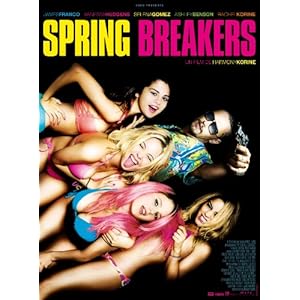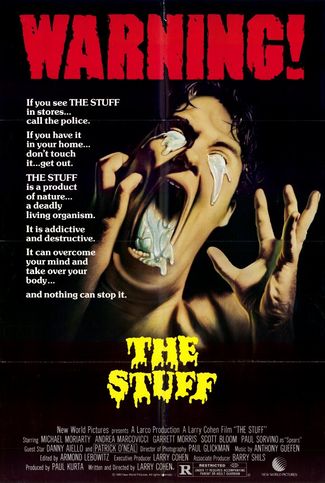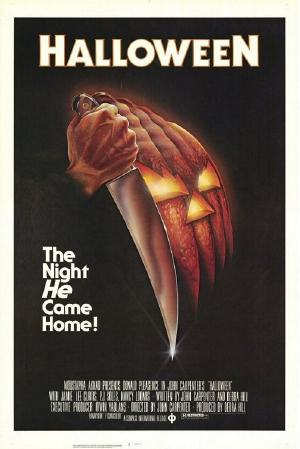
The Movie: Four college girls have been best friends since kindergarten, and are still attending school together. They also really like to party. Well, Faith (former Disney sweet young thing Selena Gomez) does try to be a good girl. She’s part of a conservative church group, but despite her group’s warnings she still likes to hang out with her friends. Cotty (Rachel Korine, wife of the director), on the other hand, is really into the whole ‘party girl’ thing. And as for Candy (former Disney sweet young thing Vanessa Hudgens, last seen on this blog in Sucker Punch) and Brit (Ashley Benson of the TV show Pretty Little Liars); don’t turn your back on them.
The four girls are determined to go to Florida and have the ultimate Spring Break. Unfortunately, Spring Break is almost here and they haven’t saved anywhere near enough money. Fortunately for the girls, but not any of the other people involved, Candy and Brit have a brainstorm on how to get the needed cash. Armed with ski masks, squirt guns and hammers, and with Cotty driving the getaway vehicle, they rob a local restaurant. The girls are suddenly rolling in cash, and it’s off to Florida as planned.
As always, however, the good times inevitably hit a snag. A wild party the girls are attending gets raided by the police. Worse, all of the girls’ ill-gotten loot has been blown on booze, drugs and scooters; so they can’t afford to pay bail. This is compounded by the fact that none of them, particularly Faith, want their families to know what they’ve really been up to. However, Fate decides to grant them a guardian angel of sorts.
Actually, fallen angel is probably more accurate. The girls catch the attention and interest of a drug dealer who goes by the handle “Alien” (James Franco, of the Sam Raimi Spiderman trilogy). Alien swoops in and pays the girls’ bail, then offers to show them the good time they’re after. Faith does the smart thing and bails out, taking the bus back home. However, the other three girls are very interested in what Alien has to offer them. This is going to land them in some trouble. Another drug dealer feels that Alien has gone too far poaching on his turf, and is determined to remove the problem. The fact that Candy, Brit and Cotty are so eager to work for Alien is going to bring them right into the middle of the conflict. Then again, Candy and Brit have up to this point shown definite signs of being junior crime lords in the making. Maybe this won’t be so disastrous for them after all…
The Review:
“Spring Break, bitches!"
Is it weird to be disappointed that a movie isn’t anywhere near as bad as you were expecting it to be? That’s the $64-million question I am putting before my readers. When I saw the previews for Spring Breakers, they put to mind a certain kind of movie. They promised four popular young things, two of them who were only recently Disney teen poster girls, showing as much bare skin as their nudity clauses would allow; drug fueled mayhem, sleaze, depravity, explosions, weirdness, and a really bad plot and script. Of course, I had to check it out. However, the movie I actually did see, while it did have its moments, never quite lived up, or maybe I should say down, to my expectations.
Admittedly, the bar was probably set way too high, or low, as the case may be, from the start. After all, among a great many other things I have long submitted myself to the likes of grindhouse exploitation movies, B-flicks, low-budget sexploitation, no-budget sexploitation, independent films, young John Waters, David Cronenberg, Jesus Franco, Ken Russell, a handful of truly fucked-up Japanese flicks, and more Italian porn than is probably healthy for a single individual. No major Hollywood studio these days could possibly meet the standards that that sets, nor would they want to. Also, actresses these days, particularly young actresses with the kind of status that Gomez and Hudgens currently possess, have some pretty strict clauses in their contracts as a matter of course that limit how far they are able to go on screen. There is some hope for Hudgens, who I will elaborate on shortly; but while the advertising campaigns play on Disney “good girls” breaking into “big girl” roles, the sad truth is that at this juncture Gomez and Hudgens still have far too much riding on their good girl image to risk throwing it away just yet.
As I said earlier, Spring Breakers does have its moments. It is undoubtedly a consciously weird movie, although the constraints of the Hollywood studio system insures that it’s not exactly envelope pushing; maybe envelope tapping. Parts of the movie definitely look like a drug trip. There’s also a tendency to loop scenes and lines of dialogue, switch them around, and play the dialogue from one scene while we watch another scene entirely. Sometimes it works for effect, sometimes it’s just irritating. Also, the one image that really sticks with me is two girls in neon yellow bikinis and hot pink ski masks wielding sub-machineguns.
As for the sleaze, that’s a little bit harder to pin down. It is definitely a sleazy movie, at least for the first half. However, at about the halfway point it feels like the movie has grown bored with the sleaze and cut down on it for the most part. Also, there are definite limits. In its favor, I will say that Spring Breakers is honestly and sincerely sleazy; none of that attempt at making “safe sleaze” or promising something and then chickening out. However, it feels like at the beginning the director drew a line and said “up to this line the sky’s the limit, but this is as far as we go.” I can’t decide how much of this is admirable restraint and how much of it is just studio restriction.
Of the cast, I would have to rank Franco as the best. Admittedly, Alien is a caricature; but he’s a very convincing and believable one. The highest point of favor I can give to Franco in his role here is that I didn’t recognize him. I have a very good memory for faces, if not necessarily names or contexts. Even if I can’t attach a name or a context to an individual, sadly an all too common occurrence for me, I can usually recognize that I know a face from somewhere. The fact that it wasn’t until I was looking up stuff for this review that I finally recognized him speaks volumes for this man’s talent. As I’ve mentioned in other reviews, my favorite actors tend to be the ones who can sink so far into their character that we actually forget we are watching them.
Franco also has the funniest scene in the movie, a monologue where he’s trying to impress Candy and Brit with the alpha male routine. “Look at my shit,” he says multiple times, fortunately meaning it in the very figurative sense. The following is paraphrased, but it’s the basic gist of his monologue, interspaced by proclamations of ‘look at my shit’: “Look at all this cool stuff I have! I have all this money! Look and swoon at what a strong, virile, male I am! Look at my phallic overcompensation devices (i.e. guns, and if that’s how you’re going to use them, I’ll call it like I see it) and visualize what I’m trying to convey with them!” However, after doing the desired oohing and ahing, the two girls each grab a gun and use it to play their own dominance game; and Alien discovers that these aren’t just two young bimbos he can seduce, but younger, female versions of him. Of course, he’s automatically in love.
The other lead that caught my eye was Hudgens. Now, up to this point I’ve been on the fence about her as an actress; having never seen any of the High School Musical movies, and finding that in the only other movie I’ve seen her in, Sucker Punch, she’s really not given anything to work with. In Spring Breakers, she scared the hell out of me. Hudgens very believably portrays Candy as nihilistic, amoral, and extremely vicious about getting what she wants. Now I know some of my longtime readers will point out how I tend to be most attracted to women who scare me; but seriously, Candy I would stay as far away from as possible. I can now believe that Hudgens is genuinely interested in more mature roles. She won’t be claiming the crown of Lina Romay or Linnea Quigley anytime soon; but I’m sure that we will see gradually more mature and risqué roles from Hudgens in the future. She has some genuine talent and potential as an actress if she keeps working at it.
As for the female leads as a whole, I had no trouble believing they were college party girls; a back-handed compliment if I’ve ever given one. It’s funny, considering the media blitz, but Gomez really doesn’t go out of her “good girl” roll at all. Unfortunately, the screenwriter didn’t know how to portray why she is that way, so Faith is more a cipher than anything else character wise. Not only that, but she leaves as soon as things start getting interesting. On the one hand, how often do you see characters making smart decisions in these movies? On the other, though, this was the perfect set-up for an “innocents in over their heads” style exploitation movie; and the vile part of me that likes to watch those things was screaming in fury that they didn’t follow through on it.
Ultimately, Spring Breakers as a movie occupies that awkward neither realm that lies between an exploitation and an art film, but doesn’t qualify as either. On the exploitation side, the movie refuses to truly dive down into the sleaze; although the first ten minutes made me think it would. However, on the art side, I got the impression that the director truly was trying to make a point. Unfortunately, I never figured out what that point was, it was too garbled. The ending is one of those maddeningly vague, ambiguous movie endings that I have long learned to associate with either the director not knowing how to end it, or the studio deciding they didn’t like what he had and making him change it. There was a major missed opportunity to raise it up and take it an innovative direction, which disappointed me.
If you mostly watch just mainstream Hollywood movies, you will probably find Spring Breakers weird and sleazy. However, for somebody like me who actively seeks out the truly weird and socially unacceptable, it’s actually rather tame. Spring Breakers does have its moments and I did have some fun with it, but ultimately I found this movie to be not particularly memorable, either in the positive or negative sense.
Side Note: I put up a few more links to other blogs. In particular, please check out Horror Movie Medication. The gentleman in question just started that blog, but thus far he has some good reviews and fascinating insights.






